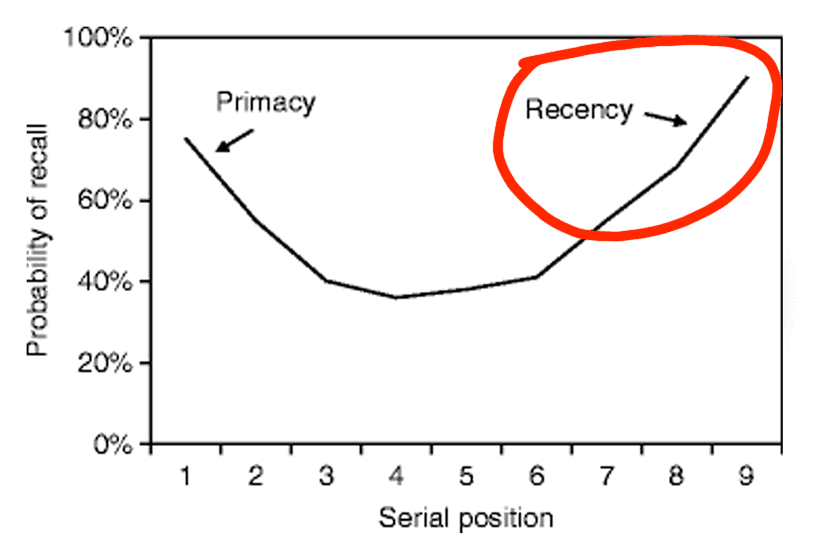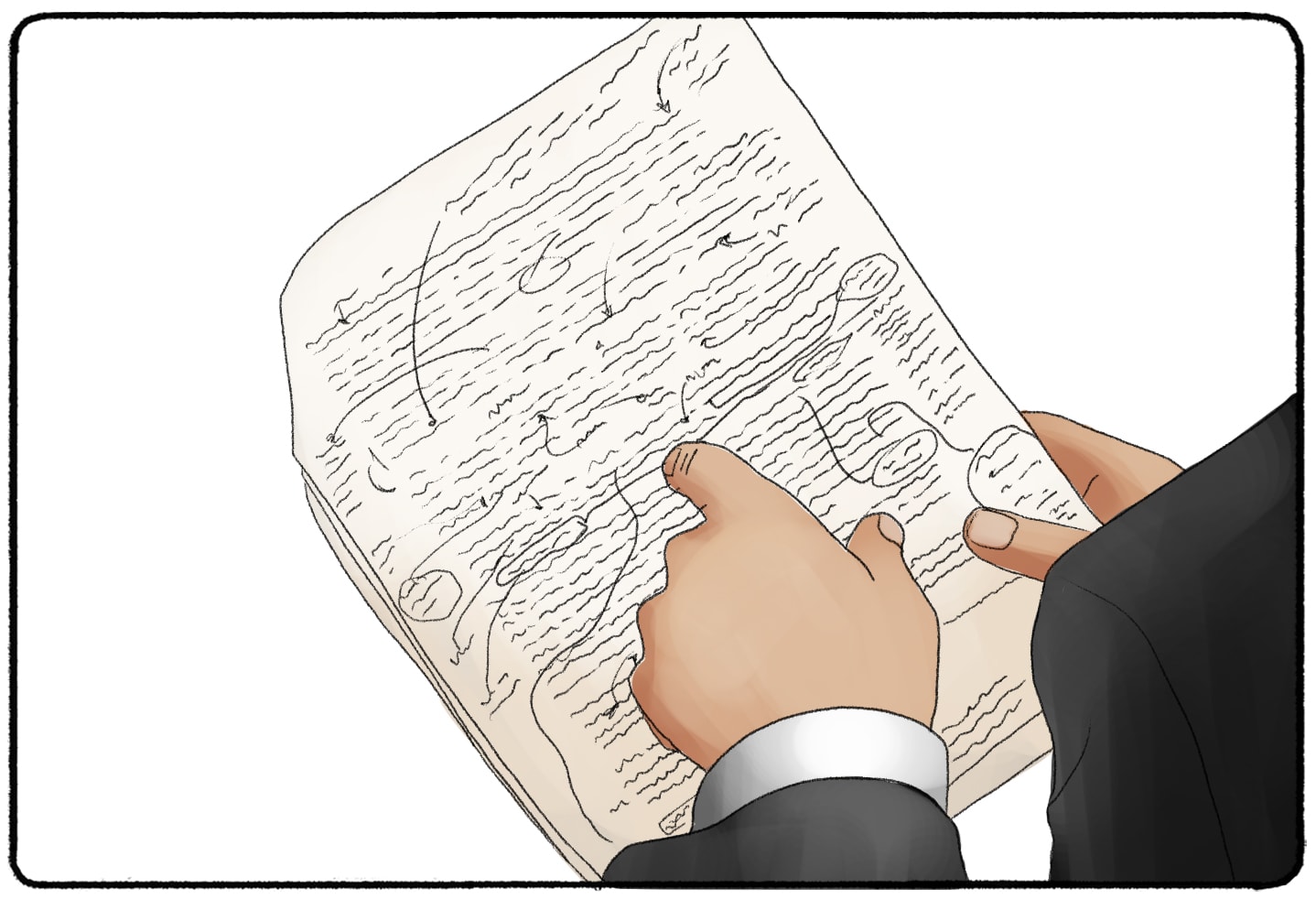Maybe you're studying the Recency Effect for a psychology class you have, or maybe you are performing some research on memory. Either way, my goal with this page is to give you the best resource on the topic!
What Is the Recency Effect?
In psychology, the recency effect suggests that when you learn information in a list, the items at the bottom of the list are easiest to recall. Even when you learn five things in a span of ten minutes, you’re more likely to remember and recall the most recent thing first.

What is the most important item on your to-do list? What is the most important item on your grocery list? If someone in a sales meeting could just remember one thing that you tell them, what would it be?
These are questions that psychologists have been trying to answer for decades. Their findings have given us a glimpse into how we store and recall information. Not all of these findings have given us a full answer to the questions about memory - but each piece of information, each theory, is crucial to understanding how our brains work.
One of these pieces is the Recency Effect. This theory shows why it’s important to leave a good last impression.
Serial Position Effect and Curve
The recency effect, paired with the primacy effect, helps to support the Serial Position Effect and Curve. German psychologist Hermann Ebbinghaus, as well as psychologists Atkinson and Shiffrin, are most closely tied to coining and supporting these theories.
Interference
Later research on the Serial Position Effect shows a key difference in the information at the beginning of a list and at the end of a list. The information at the end of the list is more likely to be stored in a person’s short-term memory, than any other information.
One of the most cited studies that support this claim is from the late 1980s. Similar to previous studies, Cohen RL asked participants to memorize items from a list. But participants were split into groups. Some had to immediately recall items from the list, and others were given tasks or just time to distract them before recalling items. The groups that had to repeat items immediately were much more successful at recalling items at the end of the list.
The groups that had other distracting tasks were subject to interference.
In short, interference in memory is when there is a fault in moving items from long term to short term memory. Some call it forgetting.
The work on interference has given psychologists valuable insight into how we store memories and later recall them.
Examples of Recency Effect
Example 1: In Court
One of the most well-known studies on the recency effect revealed how juries may make their decision in court. Psychologists Miller and Campbell presented different groups of participants with two arguments: one in favor of the plaintiff and one against the plaintiff. They switched around the arguments in some trials and delayed the participants from making decisions in others.
They found that when there was a delay between the two arguments but there was no delay in between the second argument and the decision, the recency effect occurs. The “jury” were more likely to remember (and vote with) the second argument presented. For example, if the participant first heard the argument against the plaintiff and then heard the argument for the plaintiff, they were more likely to vote for the plaintiff immediately after the second argument was over.
Example 2: In Sales
The Recency Effect is likely to kick in when you are hearing information about a product on the market. Before the product’s launch, you might hear all about the product’s features and the great things about it. Then, the product is on the market and you hear stories about the product malfunctioning and not working well. You’re less likely to buy the product because the fresh reviews are stuck in your mind.
Marketers and brands try to manipulate this information by controlling the messages that you see on social media or online before you purchase the product. They also pay extra attention to the packaging and window displays around the product, giving you a good “last” impression before you make your decision.
Example 3: Last Words
The last thing that someone says to you is likely to stick in your head more than the things you heard them say a week ago or a few years into your relationship. This last message from a person, whether it is positive or negative, may stick with you and override the impression you got from them throughout the course of your relationship. If someone’s last words to you were a compliment on your clothes, you are more likely to regard them in a positive light, even if the rest of your relationship wasn’t so outstanding.
Example 4: Recency Effect in Interviews
Interviews can be overwhelming, especially when you have to interview multiple people back to back. How can you remember everyone that you met with in a given day?
Most likely, the last person that you met is going to stick out in your mind more than the other people that you interviewed throughout the day. This can unfairly give them an advantage (or disadvantage, depending on how they performed.) The interviewers will have more information fresh in their brains to talk about the last person.
It’s important to take notes throughout an interview, as a juror, or at any time where the recency effect might kick in! These notes provide a more balanced look at what you’ve learned throughout the day and will help you remember everything that happened in the middle.
Example 5: In Television Shows
Reddit user USAFAN20 asked The Bachelor subreddit whether this played out in the popular dating show:
"For example in Hannah Brown's season
The order was this
Meet Parents: Tyler First, Then Jedd
Final Date: Tyler First, Then Jedd
Is this where the recency effect played into effect here, where Hannah remembered emotions, and feelings, and her date with Jedd more than Tyler? Is that why she chose Jedd.
Does the recency effect fit with who the lead picks?"
The comments are quite entertaining!
How to Use the Recency Effect
Intentionally Organize Information
What is the information you want to share? What is the most important information that you want to share?
You should always be asking these questions when you are writing an essay, creating a speech, or building a website. Intentionally organizing this information will help you communicate your message more effectively.
If you put all of the important information in the middle of your material, it is more likely to leave the minds of whoever is reading or consuming that information.

End Material With A Conclusion and a Call to Action
What is the message you want to leave viewers or readers with? How do you want them to feel when they finish your book or reading material? Add that information or feeling to the end of your material.
Sometimes, this means repeating information that you explained in the middle of your material. A conclusion or a “wrap-up” gives people a nicely packaged set of information that they will take with them.
A call to action will tell people what to do - and that command or request will be most likely to stick in someone’s mind as they plan their next steps. You might have been organizing your information using the recency effect without even knowing what it is!
Always End on a Good Note
The recency effect still applies even when there are no lists to review or small pieces of information to remember. You can use the recency effect during a meeting or on a date to make yourself look more favorable.
When you are planning out your meeting notes, look at where and when you are working through objections and negotiations. If both parties cannot agree on something, you might create a sour mood in the room.
Don’t leave on that sour note. Find a way to dispel the tension and leave on a good note. Speak to the great service that the other party has provided or how you have enjoyed working with them in the past.
If you leave on a sour note, follow up with a more positive note after the meeting ends. These are the sentiments that the person will remember when they go to recall their overall impression of the meeting.
The same applies to a date. If you get into an awkward conversation or get rejected, don’t storm out or leave the evening on a bad note. Change the direction of the conversation or have a genuine, more authentic conversation. Again, you can always follow up with a nice note. The next day, when your date’s friends ask how it went, they are more likely to say that it was nice, rather than go into a story about how awkward it was.
There Are Many Things That Affect Memory Recall
Interference can put a wrench in the recency effect. High emotions and repetition can also affect how you remember events or information. Simply saying something nice at the end of a bad meeting will not alter the other person’s entire memory of the event.
